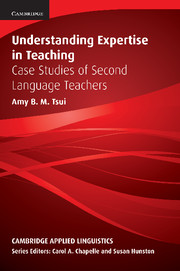Book contents
- Frontmatter
- Contents
- Series Editors' Preface
- Acknowledgments
- Chapter 1 Introduction
- Chapter 2 Conceptions of Expertise
- Chapter 3 Characteristics of Expert and Novice Teachers
- Chapter 4 Teacher Knowledge
- Chapter 5 The Case Studies
- Chapter 6 The Professional Development of the ESL Teachers
- Chapter 7 Teacher Knowledge and Managing the Classroom for ESL Learning
- Chapter 8 Teacher Knowledge and the Enactment of the ESL Curriculum
- Chapter 9 Taking on the Challenge: Exploring Process Writing
- Chapter 10 Understanding Expertise in Teaching
- Appendix 1 Reader's Comment Form on First Draft for the Second Writing Task (Angel's First Draft)
- Appendix 2 Learner Training in Making Revisions
- References
- Index
Chapter 4 - Teacher Knowledge
Published online by Cambridge University Press: 05 October 2012
- Frontmatter
- Contents
- Series Editors' Preface
- Acknowledgments
- Chapter 1 Introduction
- Chapter 2 Conceptions of Expertise
- Chapter 3 Characteristics of Expert and Novice Teachers
- Chapter 4 Teacher Knowledge
- Chapter 5 The Case Studies
- Chapter 6 The Professional Development of the ESL Teachers
- Chapter 7 Teacher Knowledge and Managing the Classroom for ESL Learning
- Chapter 8 Teacher Knowledge and the Enactment of the ESL Curriculum
- Chapter 9 Taking on the Challenge: Exploring Process Writing
- Chapter 10 Understanding Expertise in Teaching
- Appendix 1 Reader's Comment Form on First Draft for the Second Writing Task (Angel's First Draft)
- Appendix 2 Learner Training in Making Revisions
- References
- Index
Summary
In Chapter 3, I outlined findings of studies on novice-expert teacher comparisons. I pointed out that these studies were heavily influenced by the information-processing model in cognitive psychology, and that though the features of expertise in teaching identified were commonly found in expertise studies in other domains, I questioned whether these studies accurately captured the way teacher knowledge is held and developed. I also pointed out the lack of attention being paid to the subject content aspects of teacher knowledge. In this chapter, I shall focus on approaches to investigating teacher knowledge, which are fundamentally different from the information processing model, and discuss the insights that they provide for investigating teachers' lives, teachers' knowledge and how it is acquired.
One of these approaches focuses on teacher knowledge as personal, practical, and tacit knowledge developed in the course of engaging in the teaching act and responding to the context of situation. It is very much influenced by the work of philosophers. Studies adopting this approach focus on teachers' personal understanding of the practical situations in which they work and how their professional knowledge is embedded in and developed through their daily practices. Another approach takes an anthropological perspective on teacher knowledge. It sees teacher knowledge as situated in the specific context in which teachers operate. It focuses on the characteristic features of the environment in which teachers work and the knowledge so developed.
- Type
- Chapter
- Information
- Understanding Expertise in TeachingCase Studies of Second Language Teachers, pp. 42 - 66Publisher: Cambridge University PressPrint publication year: 2003
- 3
- Cited by

